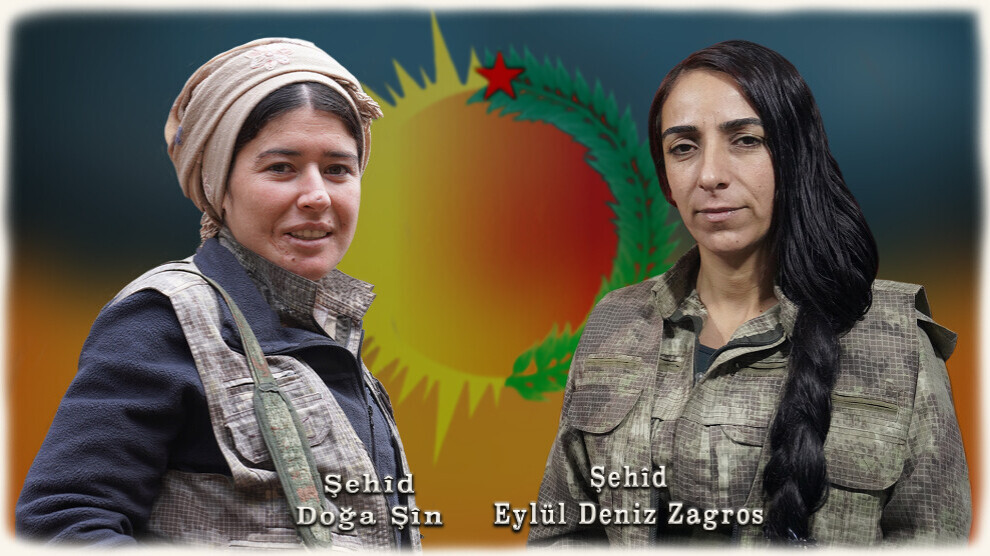HPG pays tribute to guerrillas Doğa Şîn and Eylül Deniz Zagros
YJA STAR guerrillas Doğa Şîn and Eylül Deniz Zagros fell as martyrs in Turkish attacks on Gare. The two women fought against ISIS.
YJA STAR guerrillas Doğa Şîn and Eylül Deniz Zagros fell as martyrs in Turkish attacks on Gare. The two women fought against ISIS.

The People’s Defense Forces (HPG) paid tribute to Free Women’s Units (YJA Star) guerrillas Doğa Şîn and Eylül Deniz Zagros, who fell as martyrs in Turkish attacks on Gare.
According to the HPG, both fighters were involved in resistance in various regions of Kurdistan for years and sustained fatal injuries during two separate attacks in January and February. The HPG described them as "courageous and dedicated militants" who had devoted their lives to the struggle for Kurdish freedom.
The People’s Defense Forces expressed their condolences to the families of the two fallen fighters and emphasized in their obituary the emotional connection the women had with the ideals of the movement. They were honored as role models for the new generation of young activists. The loss, they said, is a heavy blow, but their legacy will live on, in political work, the fight for recognition and rights, and in the cultural memory of the Kurdish movement.
"Doğa and Eylül were not just militants; they were symbolic figures of a movement that stands against oppression and for a life of freedom," the statement read. Their courage and determination made them role models beyond death. "We will continue their path with determination," concluded the message.

Nom de Guerre: Doğa Şîn
Full name: Binevş Altay
Place of birth: Pirsûs
Mother and father's names: Üveyş – Selami
Date and place of death: January 11, 2025 / Gare

Nom de Guerre: Eylül Deniz Zagros
Full name: Evin Işbilir
Place of birth: Gever
Mother and father's names: Güzel – Halit
Date and place of death: February 1, 2025 / Gare
Doğa Şîn
Originally from the northern Kurdish town of Suruç (Pirsûs), Doğa Şîn grew up in a politicized environment and joined the guerrillas in 2014, amid the war against the Islamic State (ISIS). Her decision was made under the impression of the attack on the western Kurdish city of Kobanê, located directly across the border from Suruç. "She promised herself at that time to support the people who had lost their homes and to stand against what she saw as the cause of their suffering," said the HPG.
Prior to that, Doğa Şîn had spent years searching for a way out of what she perceived as an alienating society. Her encounter with the ideology of Abdullah Öcalan, and especially his views on women and alternatives to the capitalist system, led her to the Kurdish freedom movement. After joining the guerrillas, she fought directly in areas where resistance against ISIS was taking place. Following an injury at the front and a lengthy recovery, she returned to active combat, this time in the mountains.
Despite coming from a flatland region, she quickly felt at home in the mountains. There, she was active in various organizational and military roles. With strong determination and tactical skill, she specialized in modern guerrilla warfare. Her comrades described her as a disciplined, creative, and reliable fighter who never shied away from challenges.
In one of her writings, Doğa Şîn described the mountains as motherly and protective, a metaphor for her journey of self-discovery. In her military operations, she reportedly stood out for her precision and dedication.
Eylül Deniz Zagros
Eylül Deniz Zagros was born in Yüksekova (Gever), in the northern Kurdish province of Hakkari (Colemêrg), a region known for its deeply rooted spirit of resistance. Her family had already been active in the Kurdish liberation struggle in previous years, which had a profound influence on her. As a teenager, she was involved in political activism, and from around 2009, she participated in organizing community self-defense. In 2012, she left university and joined the guerrillas in the Zagros Mountains.
She viewed her political and ideological training as the foundation for her later military education. According to her own accounts, her motivation was closely tied to the violent deaths of her brother and a paternal cousin in 2013 in Yüksekova. Both men were shot dead by snipers from a Turkish police special unit during a protest against the desecration of a guerrilla cemetery.
Her path in the guerrilla eventually led her into the fight against ISIS, including in the Yazidi region of Shengal, where a genocide occurred in 2014 and Yazidi women were systematically kidnapped and abused. She considered the suffering of Yazidi women as symbolic of patriarchal violence, which motivated her to resist with determination.
After several injuries, Eylül Deniz Zagros returned to the Medya Defense Areas, continued her training, and contributed to the development of new guerrilla tactics. According to the obituary, she placed great emphasis on collective responsibility, humility, and gender equality within the movement. She became a role model for many young women through her determination.